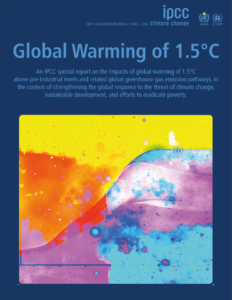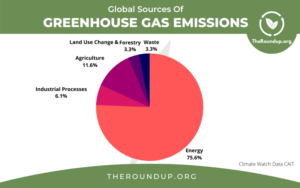Global Green House Gas Emissions rose by 1.2% from 2021to 2022, reaching a record of 57.4 gigatonnes of carbon dioxide equivalent, according to the Emissions Gap Report 2023 entitled ” Broken Record- Temperatures hit new highs, yet world fails to cut emissions again” released by the UN Environment Programme(UNEP) on Nov 20. The 14th annual report of UNEP has been published ahead of the UN climate change summit in Dubai.

The Emission gap report are released annually by the UNEP and generally provide scientific assessment of the gap between green House Gas emissions reduction percentages pledged by countries and the reductions required in present to meet the goals of Paris agreement.
It is noteworthy that the report finds the recent pledges under the paris agreement which took place on 2015, put the world on track for a 2.5-2.9°C temparature rise above pre-industrial levels this century- which is far above the 1.5 °C limit that is supposed to avoid the worst impacts of climate change. This indicates that global temparature have broken all the record and urges the need for immediate and consolidated climate action.

“Humanity is breaking all the wrong records when it comes to climate change.” As stated by inger Andersen, Executive Director of UNEP.
As per the report CO2 emissions from fossil fuel, industrial processes, de-forestation are the primary contributors to overall increase attributing for about two thirds of current GHG emissions. Additionally, the report suggests that in order to meet the goals of Paris agreement , GHG emission must decline to 33-42 GTCO2 by 2030. Even if the governments were to completely implement the Nationally Determined Commitments(NDC) under the paris agreement, average warming would still reach by 2.9°C. If such situation persists, the adverse affects of climate change such as frequent cyclone, untimely flooding, drought, extreme weather conditions, island’s sinking, uncontrollable sea level rise might worsen in upcoming years.

Though the per capita territorial GHG emissions differ across countries, top seven global emitters remain same as in 2021. They include Brazil, China, India, Indonesia, EU, Russia, USA. And most recently, the G-20 countries contributed three quarters of the total emissions and hold accountability for 76% global emissions. Therefore, countries with higher income capacity and greater responsibility for emissions are re-iterated to implement “more ambitious and rapid action”.
However, the report suggests that energy transitions such as limiting fossil fuel and switching on renewable energies , afforestation, installing new forest management mechanism would be crucial to mitigate GHG emissions within desired level and limit Global warming.











